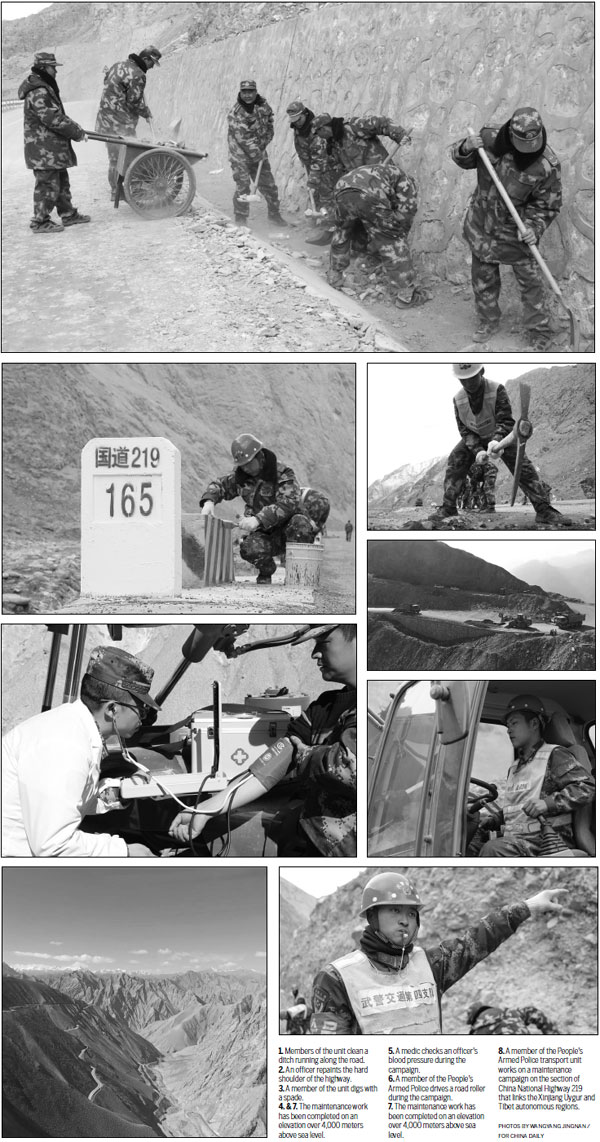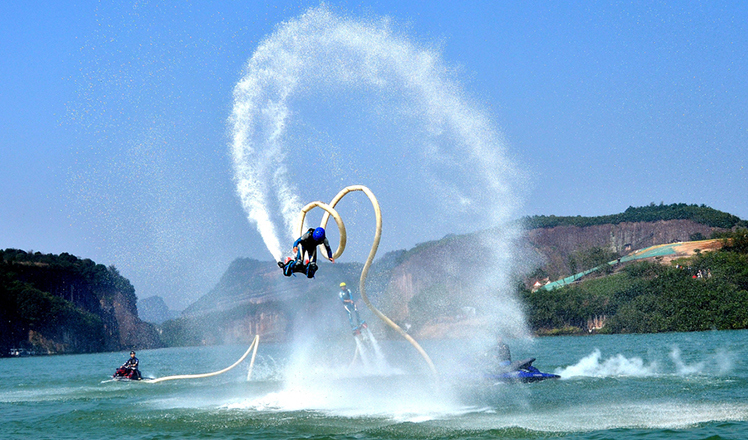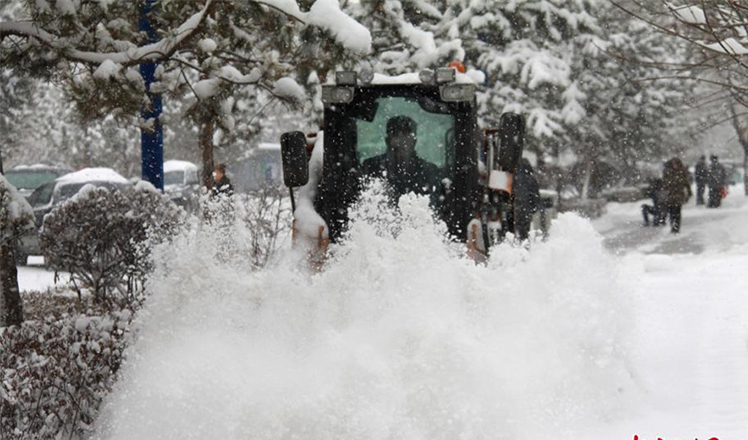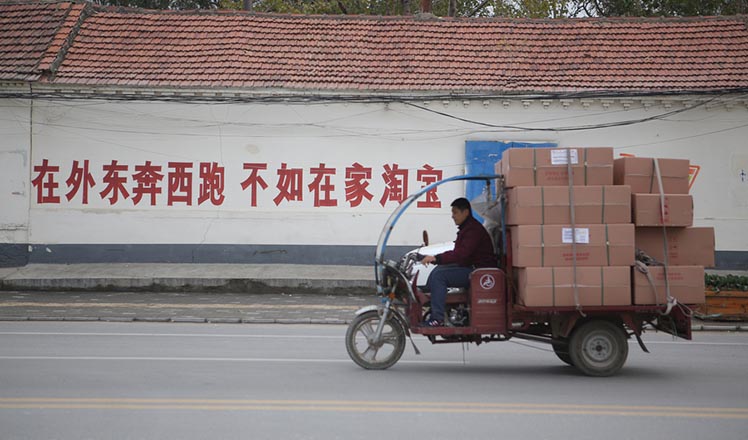Working the rocky mountain road
Updated: 2016-11-11 12:34
By China Daily(China Daily USA)
|
|||||||||

Police brave cold, altitude to keep open vital highway linking Xinjiang and Tibet
Long, arduous and prone to avalanches, landslides and frozen earth.
As one of the highest motorable roads in the world, China National Highway 219, which links the Xinjiang Uygur and Tibet autonomous regions, is not for the fainthearted.
The harsh terrain, barren landscapes and high altitude all pose their own challenges, yet for the members of the People's Armed Police transport unit, these dangers must be overcome.
The unit has been tasked with maintaining the 2,340-km long highway since 2002, and in that time the road has changed from a rough gravel track to a fully paved highway.
On Sept 28, the unit embarked on its latest maintenance campaign, amid extremes of temperature that pose a constant threat to the road conditions.
"The sharp changes in temperature make the roadbed vulnerable, and we have had to refill it with more earth to stop it sinking," said Feng Rui, 23, one of the unit's members.
Ditches that run along either side of the road also need maintaining, to prevent them becoming filled with detritus.
All the while, the police have to battle fatigue and altitude sickness due to the low levels of oxygen in the air, 4,000 meters or more above sea level.
"But everybody persists, and I also managed to stick to my post until I finally became acclimatized," Feng said, recalling his first days in Rutog county in the Tibet autonomous region, where his unit is regularly posted.
"There were landslides when we were repairing the roads, and the rocks just fell like raindrops. Then there were hailstones, which could be fatal if they hit you."
Despite the challenges, the job also brings with it an immense sense of achievement for Feng.
"When I first came here, the road was barely a road and there was constant gridlock. Now the whole of it can be open 24 hours a day. That makes me very proud," he said.
Thanks to the unit's efforts, the travel time between Yecheng county in southern Xinjiang and Ngari prefecture in Tibet has been slashed to just one day from the 15 days it took previously, with another day to reach the capital Lhasa. Road accidents and fatalities have also decreased sharply.
The speed limit on the road has been increased to 100 km per hour, and four times the amount of traffic now passes along it as when the unit started its work 14 years ago.
Feng said he was particularly proud of the fact that his unit has ensured the safety of a large number of motorists and passengers who have run into difficulties over the years.
"In one case we were able to rescue a full bus of passengers who were trapped in the mountains after they lost the road. Seeing the relief in their eyes made me so happy," he said.
However, all these improvements have not made life any easier for the police officers tasked with maintaining the road.
The low temperatures cause hot food to become cold mush within two minutes, and care has to be taken so their drinking water doesn't turn to ice. Hypothermia is another danger, and there have been cases of officers becoming so sick that they had to be transferred to a clinic.
"But after working here for long enough, you start to love the place," Feng said. "Maybe this is what I always wanted to be."
Tuo Jide, a retired armed transport police driver, has run a restaurant in Xihexiu village, near the highway, for 17 years. Business has blossomed since the road was improved.
"Decades ago, the potholes were deep enough for a yak to hide in," Tuo said. "Drivers did not dare to hit the road without plenty of food and gas in their cars. Vehicles crashed and broke down all the time along the way."
With a safe, modern highway, transportation costs from Yecheng to Ngari have fallen by 55 percent, leading to cuts of about 40 percent in the price of commodities in the Tibetan town. Better yet, the number of tourists in Ngari has surged fivefold.
"The highway today looks to me like an airport runway - wide, flat and smooth," Tuo said.
Mao Weihua in Urumqi and Xinhua contributed to the story.
- Online shopping frenzy sparks trash concern
- Is it a thing? 10 odd jobs where you can make good money
- Message on a bottle: Mineral water company launches drive to find missing children
- Snow leopards caught on camera
- A foreigner's guide to Singles Day shopping spree
- China jails 49 for catastrophic Tianjin warehouse blasts
- Americans want to change presidential election system
- UK business calls for exclusive visa system for post-Brexit London
- Australia poised to sign refugee deal with United States: media
- Philippines' Duterte says he is against 2014 defense pact with US
- S.Africa wants to work with US in promoting peace: Zuma
- Trump's victory on global pages

 Alibaba breaks sales record on Singles Day
Alibaba breaks sales record on Singles Day
 Ten photos from around China: Nov 4-10
Ten photos from around China: Nov 4-10
 Snow storm hits Xinjiang
Snow storm hits Xinjiang
 Clinton concedes election, urges open mind on Trump
Clinton concedes election, urges open mind on Trump
 Places to enjoy golden gingko tree leaves
Places to enjoy golden gingko tree leaves
 Taobao village gets ready for shopping spree on 11/11
Taobao village gets ready for shopping spree on 11/11
 Overhead bridge rotated in East China's Shandong
Overhead bridge rotated in East China's Shandong
 The 75th anniversary of Red Square parade celebrated
The 75th anniversary of Red Square parade celebrated
Most Viewed
Editor's Picks

|

|

|

|

|

|
Today's Top News
No environmental shortcuts
US election rhetoric unlikely to foreshadow future US-China relations
'Zero Hunger Run' held in Rome
Trump outlines anti-terror plan, proposing extreme vetting for immigrants
Phelps puts spotlight on cupping
US launches airstrikes against IS targets in Libya's Sirte
Ministry slams US-Korean THAAD deployment
Two police officers shot at protest in Dallas
US Weekly

|

|









